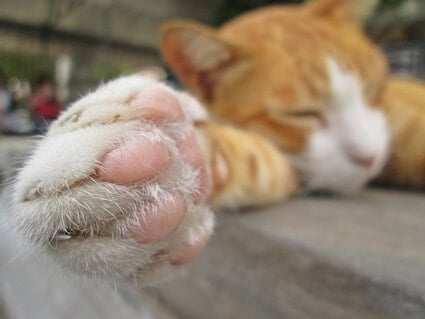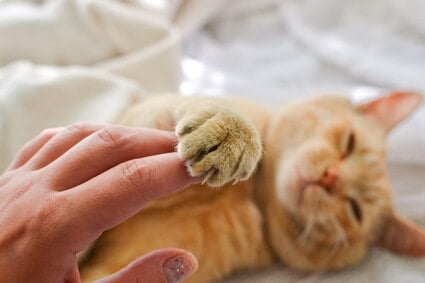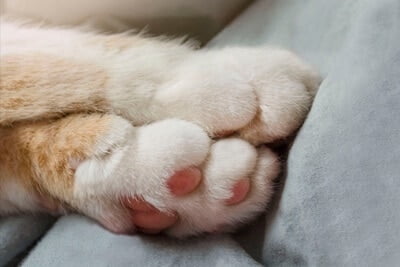Cats’ paw pads have clusters of nerve receptors that provide vital information about their surroundings. The paws are sensitive and susceptible to pain when they become overly dry and cracked. This discomfort can make it hard for your cat to walk, run, and jump.
You can heal your cat’s cracked paw pads by rubbing Vaseline on them each day. Other natural paw moisturizers that are safe include fish oil, olive oil, vitamin E oil, and coconut oil. Make sure that your cat is drinking enough water and is getting sufficient dietary protein. Also, consider keeping your cat indoors until its paw pads have healed.
Sometimes paw dryness isn’t an external issue but an internal one. An all-natural, high-protein, low-carbohydrate, and grain-free diet with added omega-3 fatty acids can form part of the solution for cracked cat paws.
Remedies for Cracked Cat Paws
| Vaseline | External moisturizer | Safe to ingest |
| Olive Oil | Naturally moisturizes and soothes | Safe to ingest |
| Coconut oil | Natural moisturizer with antibacterial properties | High in calories. Safe to ingest in small amounts |
| Fish oil | Naturally moisturizes | A highly beneficial supplement for cats |
| Hydration | Treats dryness from the inside | Add more wet food |
| Protein | Targets protein deficiency | Raw food, no-grain diet |
| Zinc | Improves scaly skin | Raw food diet and zinc supplements |
| Protective booties | Prevents exposure to chemicals | For outdoor walks |
| Indoors-only | Prevents exposure to extreme temperatures and chemicals | Heals irritated paws |
Think about what a cat’s paws have to go through every day. They’re regularly exposed to dirty surfaces, such as litter boxes and harsh chemicals, such as floor detergents.
If you have an outdoor cat, its paws are walking on rough, rocky, and muddy surfaces, snow salt, sharp items, hot and cold surfaces, and more. Over time, walking on these sorts of surfaces naturally hardens, dries, and wears out your cat’s paws.
Vaseline
People need help keeping their skin soft and healthy, and cats are no different when it comes to their paw pads. The Okaw Veterinary Clinic recommends applying Vaseline to the paw pads 2-3 times per week.
Cats lick their paws as part of their everyday grooming behavior. When you apply a balm or a salve, your cat is likely to lick its paws more because it senses something is there. That’s why it is important that you only use products that are safe for cats in case they ingest them.
Never use a moisturizing product designed for humans, even if it is made from natural ingredients. Certain essential oils can be toxic to cats.
Vaseline is safe when massaged into cats’ paw pads. Moreover, it’s rich enough to continue moisturizing your cat’s paws after continuous licking. Vaseline is also safe to ingest in small doses, and some experts claim that it may even help your cat pass hairballs.
Olive Oil
Olive oil is rich in oleic acid, linolenic acid, linoleic acid, omega-3 fatty acids, and vitamins A, D, E, and K, so it’s a good moisturizer for cats’ feet.
Olive oil soothes and heals cracked paws. A cat’s paws are irritated regularly, especially during hot and cold weather conditions. Your cat is walking barefoot across baking hot pavements and sand or freezing winter roads that have been treated with chemicals and salts.
To soothe your cat’s paws and reduce cracks and dryness naturally, massage warm olive oil into the paw pads. If your cat has just returned home from its outdoor adventures, you should clean its paws with a damp cloth before applying olive oil.
Coconut Oil
Coconut oil is an excellent moisturizer for cracked paws in cats. It’s soothing and has natural antibacterial properties.
Cracked paws are susceptible to getting infected. Applying coconut oil on cracked paws every day can help reduce the risk of paw infections in cats.
Coconut oil is completely safe when ingested by cats. In fact, it may even aid your cat’s digestion, freshen its breath, and treat hairballs.
With coconut oil, a little goes a long way. Coconut oil absorbs into your cat’s skin very quickly. Avoid applying too much coconut oil into your cat’s paws as your cat will most likely lick most of it off. Ingesting too much coconut oil may lead to diarrhea and vomiting.

Fish Oil
If your cat’s paw pads are dry or cracked, you should rub some fish oil into the paw pads after cleaning. Your cat will lick most of it off, making it a good way to introduce more fish oil into your cat’s diet.
Fish oil is the best source of omega-3 fatty acids for cats, which their bodies cannot produce on their own. It has anti-inflammatory properties, which help reduce the risk of feline inflammatory conditions, such as heart disease and arthritis.
Many cats will resist paw handling, so you may need to provide an incentive. Have your cat’s favorite treat ready before handling its feet. Break the treat into smaller pieces and offer a tidbit at each stage.
Proper Hydration
Adequate hydration is a crucial aspect of a cat’s health and wellbeing. It’s also essential in preventing dry and cracked paw pads. A cat’s water requirement increases if it is on a dry food diet. Unfortunately, hydration in cats is often overlooked as it’s hard to get cats to drink water.
Use a pet fountain instead of a regular bowl of water. Free-falling water from a fountain may entice a cat to hydrate more frequently. If your cat refuses to increase its water intake, try replacing most of its dry food with wet food. Raw cat food or canned foods are rich in moisture.
You can also look for a skin and coat cat food formula that targets dryness. Cat food for healthier skin and coat are higher in moisture levels and contain more omega-3 fatty acids.
Zinc
Oftentimes, cats experience cracked paws when their diet lacks zinc. According to the Journal of Nutrition, kittens fed a no-zinc diet had poorer coats, scaly skin, and slow hair growth.
Talk to your vet about adding zinc supplements to your cat’s diet. They may recommend giving your cat a 2.5 to 5 mg zinc supplement every day for 2 weeks until its paws start to improve.
Alternatively, you can feed your cat a raw food diet. Red meat and poultry are good sources of zinc for cats. The main benefit of homemade raw food is that it closely resembles a cat’s natural diet.
However, not everybody is comfortable with preparing and feeding their cat raw meat. There is also a risk of transferring Salmonella and E. coli to kitchen surfaces. An alternative is commercially prepared raw food, which is much easier to feed cats than home-prepared meats.
They contain more organ meat and have no added grains in them. Your cat will benefit from more amino acids, as well as zinc, omega-3 fatty acids, and other nutrients that are required for healthy skin and paws.

Protein
If your cat has very dry, cracked, or bleeding pads, it could be because its protein intake is too low.
One of the leading causes of unhealthy feline skin and coats is a nutritionally deficient diet. So, avoid low-quality foods that are packed with carbohydrates, preservatives, and cheap fillers.
In some cases, cats are getting enough protein from their diets, but their body cannot digest this protein properly due to the poor functioning of the liver or kidneys. It can also be a warning sign of diabetes.
Puppy Booties
Protect your cat’s paws with booties before it goes outdoors. Booties or socks designed for puppies may fit an average-sized cat.
Keep Your Cat Indoors
Improve the health of the paw pads by keeping your cat indoors. Not allowing your cat to wander outside will reduce irritation while other treatments are used to soothe your cat’s sore feet.
In aging cats, cracked paws may be a symptom of kidney failure or liver dysfunction. This reduces the absorption of important nutrients in your cat’s diet, thus compromising its skin and coat integrity.
Chronic skin conditions need prescription medication. If your cat shows a negative reaction to any treatment, let your vet known immediately. Your cat may be sensitive or allergic to certain ingredients in the medication.


Thanks for all the wonderful and thorough information!!